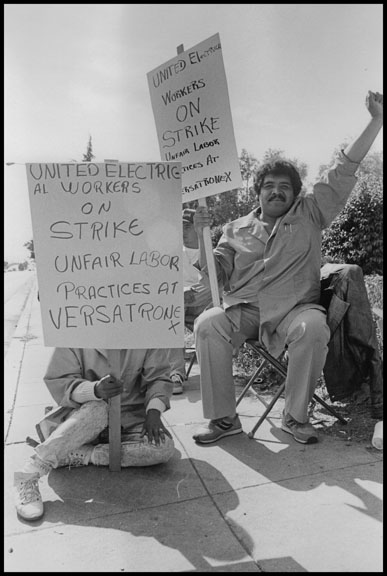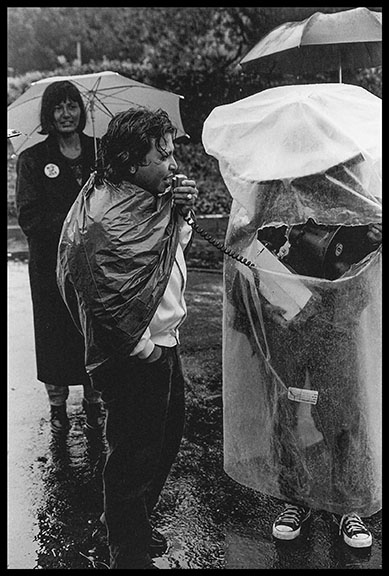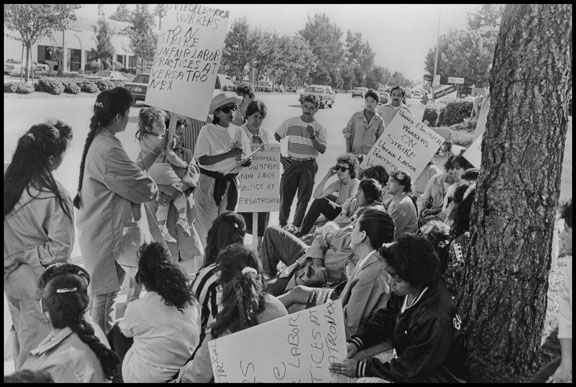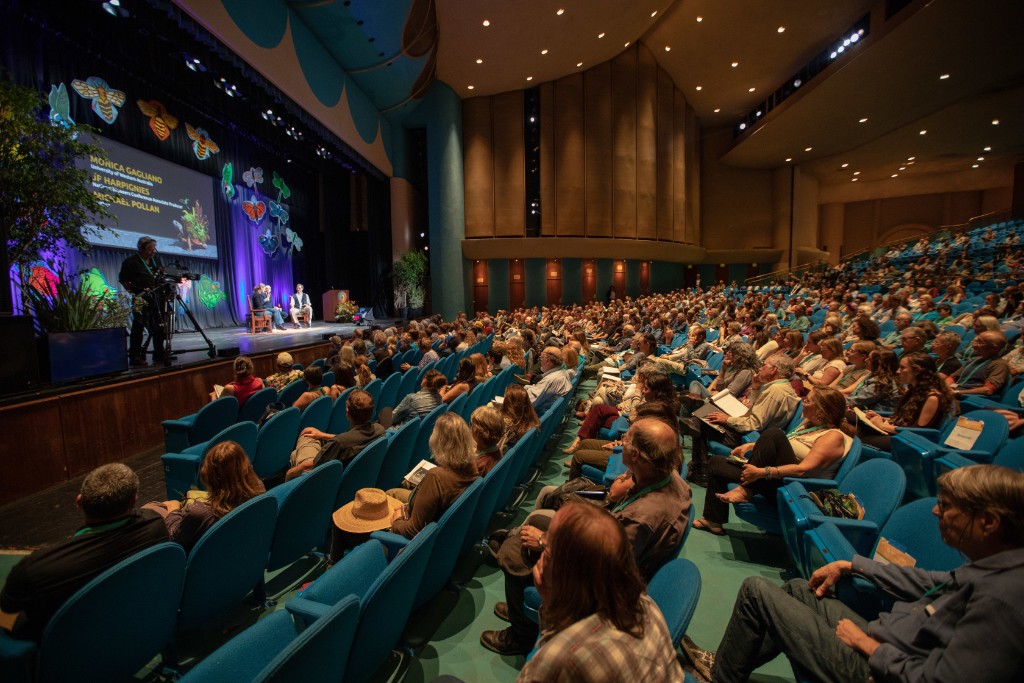WORTHLESS PROMISES IN SILICON VALLEY
By David Bacon
International Union Rights, V. 25, N. 3, 2018
https://davidbaconrealitycheck.blogspot.com/2018/10/worthless-promises-in-silicon-valley.html
http://www.ictur.org/IUR.html

Children of Versatronex workers on the picket line.
In the valley’s remaining factories, labor contractors have become the formal employers, relieving the big brands of any responsibility for the workers who make the products bearing their labels.
Today Silicon Valley remains the fortress of the country's most anti-union industry. High tech industry dominates every aspect of life. Its voice is largely unchallenged on public policy, because the workers who have created the valley's fabulous wealth have no voice of their own. Corporations like IBM, Hewlett-Packard, Intel and National Semiconductor told their workers and communities for years that healthy bottom lines would guarantee rising living standards and secure jobs. Economists still paint a picture of the industry as a massive industrial engine fueling economic growth, benefiting workers and communities alike.
The promises are worthless. Today many giants of industry own no factories at all, having sold them to contract manufacturers who build computers and make chips in locations from China to Hungary. In the factories that remain in the valley, labor contractors like Manpower have become the formal employers, relieving the big brands of any responsibility for the workers who make the products bearing their labels. While living standards rise for a privileged elite at the top of the workforce, they’ve dropped for thousands of workers on the production line. Tens of thousands of workers have been dropped off the lines entirely, as production was moved out of the valley to other states and countries.
Apple Corp. has cash reserves in excess of $1 billion, while San Jose voters are told that there is no money to pay for the pensions of workers who’ve spent their lives in public service. The productivity of industry in the valley went up in the first decade of the current century by 42 percent. But at the same time, average annual employment went down 16 percent. The upper income stratum of the valley benefited from this productivity growth, but there was no corresponding growth in jobs. Fewer people produced wealth for fewer people. The rich got richer and the poor get poorer. Between 2000 and 2010 the number of households with incomes under $10,000 more than doubled, from 11,556 to 26,310.
To make the economy serve the needs of working families, they must be organized. It’s not enough to have a voice or a “place at the table.” Silicon Valley’s 99% need the organized ability to effectively advocate for their needs, in the face of corporate resistance. But despite obstacles, for its entire history Silicon Valley has been as much a cauldron of resistance and new strategies for labor and community organizing as it has been for the production of fabulous wealth. Workers have opposed inhuman conditions. Community organizations have fought for social justice and equality. They will keep on doing that.
[. . .]
DAVID BACON is a journalist and photographer in San Francisco. He is a member of the Editorial Board of International Union Rights. He was chairperson of the UE Electronics Organizing Committee in the late 1970s and early 1980s, and an organizer for the UE at Versatronex.

Versatronex workers on strike.

Mexican and Korean workers march together in downtown San Jose to demand their labor rights.

Lino Pedres, an organizer for the janitors' union, came to the picket line to support the workers. His bullhorn was confiscated by the police, who arrested him.

Maria Pantoja, UE organizer, helps workers set up their strike committee on the picket line.
SUPPORT THE MARRIOTT STRIKERS!

You can see more images of the Marriott hotel strikers in San Francisco, Oakland and San Jose here:
https://www.flickr.com/photos/56646659@N05/albums/with/72157670824833767
Exhibition Schedule
Exhibitions of photographs are scheduled for the following venues and dates:
In the Fields of the North / En los campos del norte
August 8, 2018 - October 14, 2018
Artist talk, Saturday, August 25, 5pm
Museum on Main,
603 Main Street
Pleasanton, CA 94566
In the Fields of the North - Scheduled exhibitions:
January 13, 2019 - March 10, 2019
Vallejo Naval and Historical Museum, Vallejo
September 1, 2019 - December 22, 2019
Hi-Desert Nature Museum, Yucca Valley
January 5, 2020 - March 1, 2020
Community Memorial Museum of Sutter County, Yuba City
March 15, 2020 - May 10, 2020
Monterey Country Agricultural and Rural Life Museum, King City
March 21, 2021 - May 23, 2021
Carnegie Arts Center, Turlock
In Washington’s Fields - Scheduled exhibition:
February 5, 2020 - July 15, 2020
Washington State Historical Museum, Tacoma, WA
In the Fields of the North / En los Campos del Norte
Photographs and text by David Bacon
University of California Press / Colegio de la Frontera Norte
302 photographs, 450pp, 9”x9”
paperback, $34.95 (in the U.S.)
order the book on the UC Press website:
ucpress.edu/9780520296077
use source code 16M4197 at checkout, receive a 30% discount
En Mexico se puede pedir el libro en el sitio de COLEF:
https://www.colef.mx
Los Angeles Times reviews In the Fields of the North / En los Campos del Norte - clickhere
En los campos del Norte documenta la vida de trabajadores agrícolas en Estados Unidos -
Entrevista con el Instituto Nacional de la Antropologia y Historia
http://www.inah.gob.mx/es/boletines/6863-en-los-campos-del-norte-documenta-la-vida-de-trabajadores-agricolas-en-estados-unidos
Entrevista en la television de UNAM
https://www.youtube.com/watch?v=xdSaBKZ_k0o
David Bacon comparte su mirada del trabajo agrícola de migrantes mexicanos en el Museo Archivo de la Fotografia
http://www.cultura.cdmx.gob.mx/comunicacion/nota/0038-18
Trabajo agrícola, migración y resistencia cultural: el mosaico de los “Campos del Norte”
Entrevista de David Bacon por Iván Gutiérrez / A los 4 Vientos
http://www.4vientos.net/2017/10/04/trabajo-agricola-migracion-y-resistencia-cultural-el-mosaico-de-los-campos-del-norte/
"Los fotógrafos tomamos partido"
Entrevista por Melina Balcázar Moreno - Milenio.com Laberinto
http://www.milenio.com/cultura/laberinto/david_baconm-fotografia-melina_balcazar-laberinto-milenio_0_959904035.html
Die Kunst der Grenze
http://www.nrhz.de/flyer/beitrag.php?id=24304Notruf für "eine andere Welt"
http://www.nrhz.de/flyer/beitrag.php?id=24087
Die Apfel-Pflücker aus dem Yakima-Tal
http://www.nrhz.de/flyer/beitrag.php?id=23990
"Documenting the Farm Worker Rebellion"
"The Radical Resistance to Immigration Enforcement"
Havens Center lectures, University of Wisconsin, click here
San Francisco Commonweallth Club presentation by David Bacon and Jose Padilla, clickhere
EN LOS CAMPOS DEL NORTE: Farm worker photographs on the U.S./Mexico border wall
http://us7.campaign-archive2.com/?u=fc67a76dbb9c31aaee896aff7&id=0644c65ae5&e=dde0321ee7
Entrevista sobre la exhibicion con Alfonso Caraveo (Español)
https://www.youtube.com/watch?v=lJeE1NO4c_M&feature=youtu.beTHE REALITY CHECK - David Bacon blog
http://davidbaconrealitycheck.blogspot.com
Cat Brooks interview on KPFA about In the Fields of the North
https://kpfa.org/player/?audio=263826 - Advance the time to 33:15
Book TV: A presentation of the ideas in The Right to Stay Home at the CUNY Graduate Center
http://booktv.org/Watch/14961/The+Right+to+Stay+Home+How+US+Policy+Drives+Mexican+Migration.aspx
Other Books by David Bacon
The Right to Stay Home: How US Policy Drives Mexican Migration (Beacon Press, 2013)
http://www.beacon.org/productdetails.cfm?PC=2328
Illegal People -- How Globalization Creates Migration and Criminalizes Immigrants (Beacon Press, 2008)
Recipient: C.L.R. James Award, best book of 2007-2008
http://www.beacon.org/Illegal-People-P780.aspx
Communities Without Borders (Cornell University/ILR Press, 2006)
http://www.cornellpress.cornell.edu/book/?GCOI=80140100558350
The Children of NAFTA, Labor Wars on the U.S./Mexico Border (University of California, 2004)
http://www.ucpress.edu/book.php?isbn=9780520244726
En Español:
EL DERECHO A QUEDARSE EN CASA (Critica - Planeta de Libros)
http://www.planetadelibros.com.mx/el-derecho-a-quedarse-en-casa-libro-205607.html
HIJOS DE LIBRE COMERCIA (El Viejo Topo)
http://www.tienda.elviejotopo.com/prestashop/capitalismo/1080-hijos-del-libre-comercio-deslocalizaciones-y-precariedad-9788496356368.html?search_query=david+bacon&results=1
For more articles and images, see http://dbacon.igc.org and http://davidbaconrealitycheck.blogspot.com
and https://www.flickr.com/photos/56646659@N05/albums
Recipient: C.L.R. James Award, best book of 2007-2008
http://www.beacon.org/Illegal-People-P780.aspx
Communities Without Borders (Cornell University/ILR Press, 2006)
http://www.cornellpress.cornell.edu/book/?GCOI=80140100558350
The Children of NAFTA, Labor Wars on the U.S./Mexico Border (University of California, 2004)
http://www.ucpress.edu/book.php?isbn=9780520244726
En Español:
EL DERECHO A QUEDARSE EN CASA (Critica - Planeta de Libros)
http://www.planetadelibros.com.mx/el-derecho-a-quedarse-en-casa-libro-205607.html
HIJOS DE LIBRE COMERCIA (El Viejo Topo)
http://www.tienda.elviejotopo.com/prestashop/capitalismo/1080-hijos-del-libre-comercio-deslocalizaciones-y-precariedad-9788496356368.html?search_query=david+bacon&results=1
For more articles and images, see http://dbacon.igc.org and http://davidbaconrealitycheck.blogspot.com
and https://www.flickr.com/photos/56646659@N05/albums






